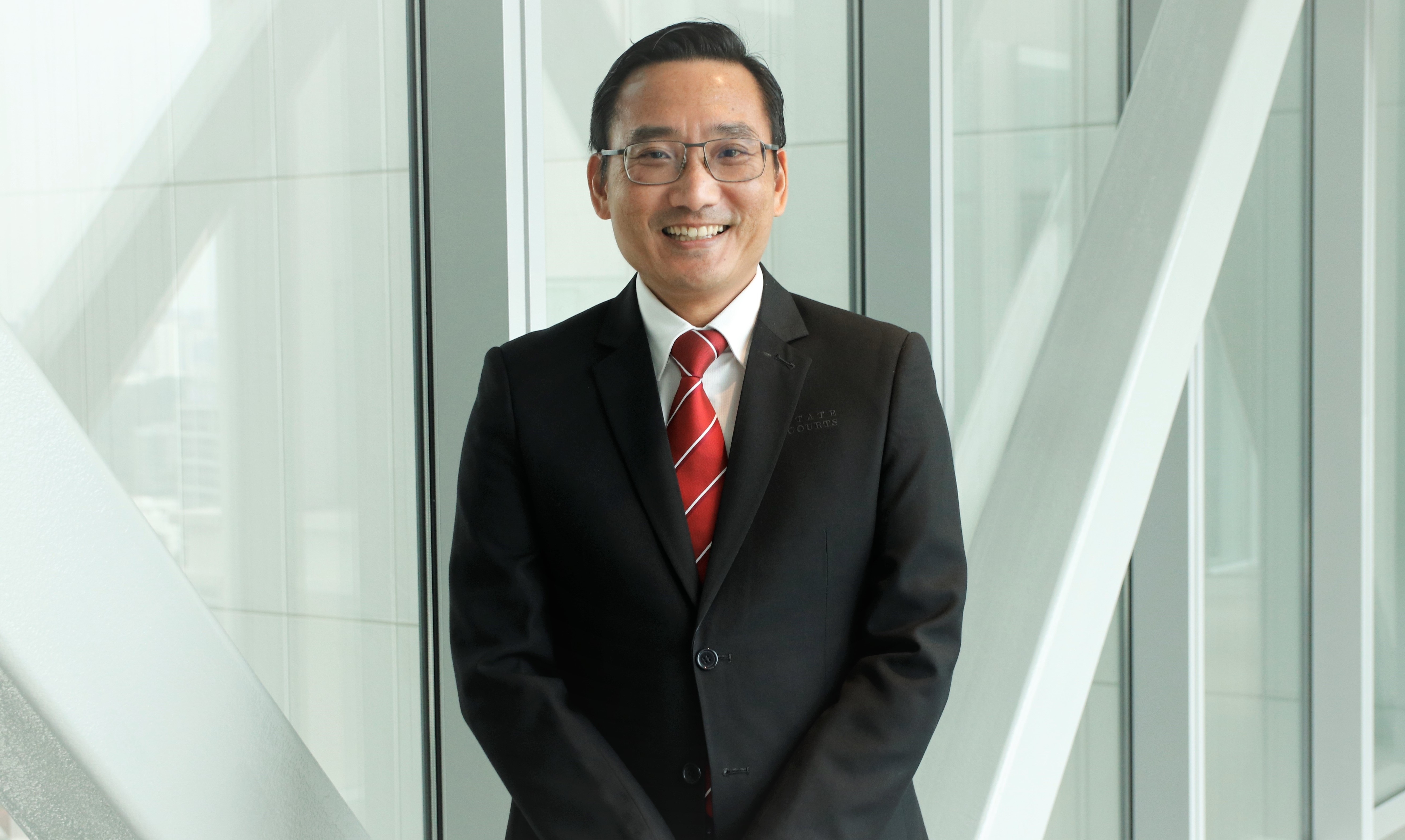KOW KENG SIONG REFLECTS ON A CHANGING JUDICIAL LANDSCAPE
The judge is publishing his third book on sentencing, this time focusing on sentencing frameworks.

BY ASHUTOSH RAVIKRISHNAN
For a profession that comes into regular contact with judges, it can be easy to forget the power that they wield. But as District Judge Kow Keng Siong lets on, the weight of this responsibility is not lost on judicial officers themselves, especially those just entering judicial service.
Keng Siong was first appointed a judicial officer in 1999, when the work environment was vastly different. “Back then, I was told that it would take us around two years of socialisation and on-the-job training before a legal officer would complete his transition into becoming a judicial officer.” That process has sped up considerably in the years since, thanks to the mentoring scheme at the State Courts, a proliferation of guidance materials for judicial officers, and greater opportunities for training from institutions like the Singapore Judicial College. Judicial officers are also better equipped with information on sentencing precedents through tools like the Integrated Case Management System and the Sentencing Information and Research Repository.
Having returned to the judicial service after more than a decade away has deepened Keng Siong’s appreciation of these changes. After nine years as a district judge, he was reposted to AGC’s International Affairs Division for about seven years, before being reposted to AGC’s Criminal Justice Division and eventually becoming a chief prosecutor in 2017. Reappointed a district judge in the Civil Cluster last year and, more recently, posted to the Crime Cluster of the State Courts, Keng Siong has seen the tangible benefits of a stronger focus on training and tools. “The amount of attention and energy given to training judicial officers these days is incredible. When I first joined the Service, a lot of the learning was done through osmosis: you see how other judicial officers discharge their duties and pick up what you can from it. Now, information on judge-craft and the law is so accessible.”
LESSONS FROM THE PAST
This notion of learning from the past is an important feature of judicial work, as it affords greater consistency and uniformity to the sentencing process. But the past may not be as useful in cases where novel legal issues are thrown up, or when precedents are inadequate. “I’m pretty sure we have come across such cases. So what do you do when the past provides no guidance? How do you arrive at a decision?”
In the case of sentencing, Keng Siong thinks the answer lies in sentencing frameworks. These frameworks, which have steadily become more prominent in recent years, play an important role in facilitating principled and consistent sentencing outcomes.
Sentencing frameworks first caught Keng Siong’s interest during his stint as deputy chief prosecutor. “I remember thinking, ‘This is a very novel, structured and robust way to sentencing.’”
In fact, Keng Siong is so interested in sentencing frameworks that he spent the past few years analysing them. He has written a book, Sentencing Frameworks in Singapore, which details his observations and learning points on the topic. The book, which will be launched later this month, is a quick reference guide on sentencing frameworks that have been issued by the Court of Appeal and High Court in the past decade. It also provides a roadmap to how criminal law practitioners can develop their own frameworks to assist them in arriving at a sentencing position. “I hope that the book can help criminal law practitioners formulate their sentencing positions more efficiently and effectively, and in the process, contribute to the development of sentencing jurisprudence in Singapore. It is also my hope that the public can, through the book, gain a better understanding of the sentencing methodology and appreciate that the sentencing process is objective and impartial.”
Sentencing is a common theme in Keng Siong’s body of work. When asked what inspired him to start writing about sentencing, he says this about his first book, Sentencing Principles in Singapore: “When I started out as a judicial officer, I wanted to have deep knowledge of the sentencing principles as sentencing is a critical judicial function. And of course, I wanted to avoid appeals against my sentencing decisions. I thus began compiling sentencing materials. After realising that I had assembled a huge body of such materials, I wanted to share the knowledge that I had gained with criminal law practitioners – to save them time in research and to enhance the quality of sentencing submissions and advocacy. This process, from the time I first started compiling the materials to publication, took a decade. Writing the books has been an enriching journey for me: I’ve developed a deeper appreciation for Singapore’s rich sentencing jurisprudence and discovered the virtues of perseverance and patience.”
When asked what other virtues he had developed in his three decades of practice, Keng Siong shared that it is that of suspending judgement until he has heard both sides on an issue. “We now live in a time where people are quick to judge. We look at a news headline and feel that an accused person is guilty, or that the sentence passed is too lenient or too heavy. Often, such judgments are based on imperfect information – without having heard the other side’s story and without having read the actual grounds of decision. And even if one has read the grounds of decision and still holds a different view, Keng Siong feels that it is important to be circumspect and remember that one’s views on the matter have not been tested yet.
Keng Siong, the author of Sentencing Frameworks in Singapore, will speak at this year’s Sentencing Conference. Conference participants who purchase a Book + Conference Pass will receive a copy of Sentencing Frameworks in Singapore. Get your pass here.






